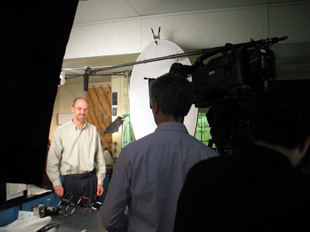 |
Jonathan Vennerstrom, Ph.D., associate professor of pharmaceutical sciences, UNMC College of Pharmacy, gets ready to be interviewed by William Hicklin of the British Broadcasting Corporation (BBC). |
The BBC interviewed Dr. Vennerstrom last week and videotaped his team in the lab. Dr. Vennerstrom is leading an international team that developed an anti-malarial drug candidate. The World Health Organization has lauded the drug. If successful, the drug candidate could become a major new weapon against multi-drug resistant malaria.
William Hicklin, of the BBC in London, said the story will be part of a larger production on malaria and the new ways scientists are combating malaria. It is scheduled to air on BBC television in February or March 2005.
In the United Kingdom, BBC operates eight television channels and 10 radio networks, 46 local and national radio stations, and the online site bbc.co.uk. Internationally, BBC World Service broadcasts on radio in 43 languages. BBC World delivers a global television news service, and the online site bbcnews.com offers international news and audio.
“Malaria is one of prime causes of death in the world from infectious disease still,” Hicklin said. “They (officials with Medicines for Malaria Venture) told me that the particular drug Dr. Vennerstrom has developed is one of the most promising drugs that’s in development right now.
“If it goes well, as they expect it will, then hopefully in four years time there will be a new anti-malarial drug that could quite literally save millions of lives. It all starts here in this lab in Nebraska because without his work then they wouldn’t be able to get to where they are now.”
The anti-malarial drug candidate has undergone phase I clinical trials in London to evaluate safety of the drug candidate in a small group of healthy human volunteers. Phase II trials are expected to begin in Thailand early next year.
Dr. Vennerstrom’s team is made up of scientists from the UNMC College of Pharmacy, Monash University in Australia, the Swiss Tropical Institute with support from F. Hoffmann-LaRoche pharmaceutical company. The team has received $5.5 million in funding from Medicines for Malaria Venture (MMV) of Geneva, Switzerland.
MMV receives funding and support from the following organizations: Bill and Melinda Gates Foundation, ExxonMobil Corporation, Global Forum for Health Research, International Federation of Pharmaceutical Manufacturers Associations, Netherlands Minister for Development Cooperation, Rockefeller Foundation, Swiss Agency for Development and Cooperation, United Kingdom Department for International Development, World Bank, World Health Organization, Roll Back Malaria, BHP-Billiton and The Wellcome Trust.